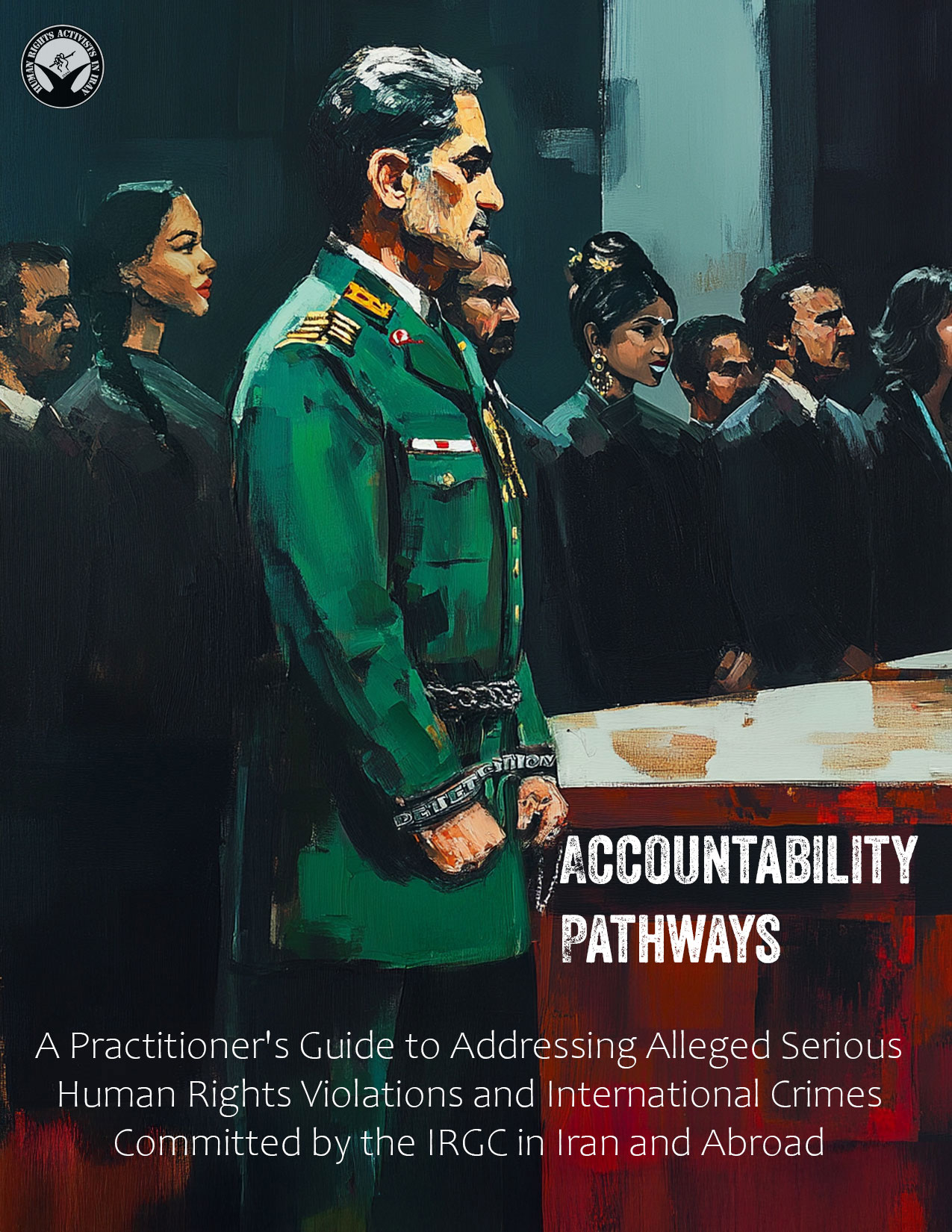April 9, 2025 – HRA’s latest report published today presents a detailed roadmap for accountability for members of Iran’s Islamic Revolutionary Guard Corps (IRGC) and alleged involvement in serious human rights violations and international crimes both inside Iran and around the world.
Accountability Pathways: A Practitioner’s Guide to Addressing Alleged Serious Human Rights Violations and International Crimes Committed by the IRGC in Iran and Abroad
This publication, prepared by HRA with the legal support of UpRights, is part of the Pasdaran Documentation Project (PDP), an HRA initiative dedicated to mapping the IRGC from inception to the present day alongside addressing violations and international crimes perpetrated by its members.
The guide spans over 20 judicial and quasi-judicial pathways for accountability, offering practitioners concrete guidance on available mechanisms to seek justice for serious human rights violations and international crimes attributed to the IRGC both within Iran and abroad.

The IRGC has played a central role in the systematic suppression of political dissidents, activists, and journalists within Iran, as well as in the abduction and extrajudicial targeting of perceived regime enemies beyond Iran’s borders. The IRGC’s involvement in armed conflicts, particularly in Syria and Iraq, has also led to allegations of grave international crimes. Despite these extensive allegations, Iran’s legal system lacks independence, rendering domestic accountability mechanisms ineffective. The Iranian judiciary remains complicit in widespread human rights abuses, making external avenues for justice essential.
This guide is designed to equip civil society actors, victims, and legal practitioners with practical tools to navigate the complex landscape of accountability mechanisms. It systematically outlines the feasibility, strengths, and limitations of various pathways, categorized into:
- Domestic judicial mechanisms in third states, including universal jurisdiction and extraterritorial prosecutions;
- International tribunals, such as the International Criminal Court and the International Court of Justice;
- United Nations mechanisms, including special procedures and treaty bodies;
- Targeted sanctions regimes, such as Magnitsky-style sanctions against human rights violators;
- Truth-seeking initiatives and other transitional justice approaches.
- And more
The publication also draws on 12 incidents that were analyzed under international law as part of the Pasdaran Documentation Project by UpRights and HRA.
These incidents and their associated analyses and alleged perpetrators, provide critical insights into patterns of violations and the modus operandi of the IRGC. These incidents’ full details and legal implications can be accessed at iranpdp.org.
Given Iran’s non-cooperation with international accountability mechanisms and its rejection of key human rights instruments, practitioners must employ a strategic approach. The guide underscores the importance of combining judicial and non-judicial pathways, leveraging international pressure, and ensuring victim-centered approaches throughout.
Ultimately, Accountability Pathways aims to facilitate informed, coordinated, and effective efforts to hold perpetrators accountable while centering the needs and rights of victims in the pursuit of justice.
“This isn’t about theory — it’s about action. When impunity prevails, we need practical options. This guide arms practitioners with concrete tools to start the conversation on how we can move, strategically and creatively, toward justice. It’s a call to coordinate, to act, and to make clear that accountability is possible — even when states refuse to deliver it. It comes alongside a body of extensive work to uncover an intentionally veiled institution — one designed to shield decision makers and key perpetrators from public scrutiny and consequence. Together, both work in coordination to offer an opportunity to discuss new, timely, and creative paths forward.” Skylar Thompsin, Deputy Director, HRA.
Looking Ahead
The publication arrives at a moment of heightened international scrutiny of Iran’s human rights record. In recent weeks, the mandate of the UN Fact-Finding Mission on Iran has been renewed as it has identified crimes against humanity in many ways linked to the IRGC’s suppression of the 2022 protests and beyond.
Despite these developments, the report cautions that accountability will require sustained effort and international coordination. It urges states, international bodies, and civil society actors to work collaboratively, pool resources, and support action across all feasible fronts.
This recorded webinar features legal experts and practitioners discussing concrete accountability mechanisms for addressing serious human rights violations and international crimes committed by Iran’s Islamic Revolutionary Guard Corps (IRGC).
🔹 Panelists:
Valérie Gabard (UpRights)
Natalia Kubesch (REDRESS)
Skylar Thompson (HRA)
UN Fact-Finding Mission on Iran (Secretariat)
🎤 Moderator: Julie Heezius (HRA)



